- Home
- Clive Barker
Gutted: Beautiful Horror Stories Page 3
Gutted: Beautiful Horror Stories Read online
Page 3
I press the voice box against my throat, so that when I speak it sounds like an insect.
“Shut your mouth you fucking whore.”
It’s how I say I love you.
ARBEIT MACHT FREI
Lisa Mannetti
“The women were begging for a little water or a piece of bread. ‘Woda . . . khleb.’ Two words identified them as Russian. We had heard that so often, we knew ‘bread and water’ in all the languages of Europe.”
—Olga Lengyel
“I had orders to use only the absolute minimum of paper bandages when dressing the wounds of the poor victims of the dogs’ fangs and others who had been beaten into unconsciousness.”
—Judith Sternberg Newman
“‘Don’t save him,’ one of them said. ‘You’ll only be prolonging the agony. And you can see for yourself he wanted to escape it now, instead of waiting for the firing squad in a few weeks.’”
—Dr. Miklos Nyiszli
“The last thing I remember?”
I knew the Red Cross clerk probably meant just before or just after the camp I was in—Waldemar, the Nazis called it—was liberated by the Americans, but so much had happened to me, had happened to the last living member of my family, my mother Kasia, that I thought I’d better start at the beginning. Isn’t that the way of it with every important tale?
“Eligia,” my mother had always told me—especially when I was being headstrong, or she was urging me to be calm, to be brave—“your name means choice.” She’d drilled into me that one could always choose the high road, that it was always best and that it carried meaning—no matter what happened in the end.
So I chose the beginning.
And the clerk, a kindly, patient woman with upswept brown hair let me talk. The talk—and what I would tell her—would be the last thing, I knew, that I would ever choose. The high road, at last.
“We—my mother and I—were taken in Warsaw—the very end of July, 1944—just before the uprising,” I began . . .
Like all Polish youngsters, long before it happened, I’d dreamt of the thunderous rattle of Gestapo boots on the stairs. In the dream I would hear that hurried tramp, that deadly cadence punctuated by brutish knocking and furious shouts, the unstoppable upwelling fear of what was about to happen cleaved me instantly awake. In the dark, my heart thudding in my chest, I was aware the dream was no portent: only the playing out of knowing what would inevitably come. We all knew. Heard. Saw it happen a hundred times to neighbors and friends and strangers.
“It was hot that night,” I said.
The heat should have stifled the noise, but with the windows open it seemed like that angry leather stamping was coming from everywhere at the same time. Perhaps that hideous deafening echo was ubiquitous: The storm troopers might be raiding every floor of the building at once, simultaneously invading the crumbling apartments next door and across the street and down the block. We were both hidden inside the old wooden armoire that had been her wedding gift from my father. When the noise reached her bedroom, just before they flung open the door, I felt time being sucked away in both the mounting tension and the certainty of discovery. My mother didn’t flinch when I dug my fingers into her narrow wrist, she only stiffened and, her head hanging down, bit her lower lip to keep from crying out.
Sounds of chaos—the desk chair kicked aside; the bed hastily thrust up and smashing against the wall; a red glass votive candle in front of the statue of Mary shattering on the floor; flames licking what was left of the dusty curtains; the cupboard door handle finally wrenched open. More shouts. Then the pain of abrasions from floors and carpets, of being pushed and pulled and dragged down three flights to face more loaded rifles on the sidewalk. I looked up and saw dark gray smoke roiling out from my mother’s bedroom window. My father, a doctor, had been gone from us for almost five years, and I wondered if I would ever see him again.
Night-bled sights and sounds of confusion: the crunching of rifle butts against bellies and faces; gunshots; screams. The whole ragged crowd—teenage boys and middle-age women and crying children—whipped and harried by shouts and the shrill barking of infuriated dogs, all of us bullied to the train depot. We’d heard that the Germans forced the Hungarians, the gypsies—and God knew how many others—to march hundreds of kilometers all the way from Budapest to one of the camps in Germany, so that for me (a naive and somewhat rebellious and definitely angry fourteen-year-old), seeing the ailing wooden box car was something of a relief.
Stella Johansson, the Red Cross clerk, had certainly heard about those first insults to the mind and spirit: the callous insanity of cramming eighty, ninety, a hundred or more humans into each car so that there was no room to sit or lie down, no food or water given to us, and she put a consoling hand over mine when I told her how the living were forced to stand and tread upon the dying and the dead . . .
“The selection was at the ramp at Waldemar . . . ”
Everyone—by this juncture—knew about the selection process: a bored doctor tipping his finger toward one direction or another. Left, off you went to the gas chambers and the crematoria. Right, a brief respite in hell that included starvation, lice, typhus, and being worked to death—the real, true respite.
Only this time there were brief, whispered words between the doctor (Viktor Freisler, whom I’d come to know) and an untersturmfurher who barked, “Any doctors here? Nurses? Medical trainees? Orderlies?”
“Here,” my mother called out. “I’m a nurse, sir,” she said at the same time she snagged my left arm, adding, “And my daughter, she’s sixteen and she worked as an aide in the Catholic hospital, too.”
“Where, no doubt, you both hid Jews smuggled out of the ghetto,” he said.
My mother kept silent.
He looked me over. “Sixteen? She doesn’t look sixteen.”
I was tall for my age, but I didn’t think I could pass for sixteen.
“It’s the war, sir,” my mother put in. “The privations—”
“Doesn’t she speak? How old are you gnadiges fraulein?” His words were gracious; his voice was a sneer.
“Sixteen.” Even to my own ears my voice sounded hopelessly childish, but he let it pass and my mother and I stood in a clump of three or four people in the dirt road by the boxcars while the multitudes marched away, left and right, to death or death-in-life.
The sign over the camp gate—like the ones at Auschwitz and Dachau—read Arbeit Macht Frei. “Work sets you free,” my mother whispered. Then I saw her make a tiny cross of her thumb and forefinger and kiss it quickly—as if haste and secrecy would fulfill the intent of her silent prayer.
“There were no real medicines in the hospital,” I said, swallowing a lump that had risen uncomfortably in my throat. For now I was on safe ground, but how much was I going to tell this Swedish clerk with the paper nametag and the kind blue eyes? “Coming to the hospital could be a death sentence in itself,” I said. She nodded; she knew. “Every now and then word would come down that (for example) there were too many tuberculosis patients in the camp and all of those currently in bed would be sent to the gas chambers . . . to make way—ironically—for new TB victims.” I shrugged. Nazi logic was a contradiction—like “exact estimate” or “open secret”—my mother used to say.
“Our lot was only a little better than that of the other inmates, but it was better—at least in some ways. We weren’t crammed seven or more to a bunk meant for two; we didn’t have to wait in line to use the common latrines—where those who had, say, dysentery accidentally soiled themselves and then were shot for sport that masqueraded as punishment.” I paused. “So things were better mostly—but some things were not; some things were harder . . . .‘Canada’ was the root, of course: the solution—the salvation—and the problem . . . ”
“Canada” was the building and its outskirts where—under SS guards—inmates sorted through the vast array of belongings taken from those arriving on the trains. It’s almost impossible to describe the house-high hea
ps of suitcases, clothes, shoes—the mountains of spectacles or Jewish prayer books or felt hats alone, could each have filled an Olympic pool. Anything could be—and was—found by inmates who not only catalogued and heaped up the valuables and the dross from all Europe, but were taught to rummage and snip linings in coats, hidden pockets in books and valises. It was all there: jewels, money, photographs, candlesticks, pacifiers, toys, rings, bracelets, mezuzot—meant to bless now-empty Jewish homes—necklaces, brooches . . . and the food, I thought, instantly feeling saliva womb my tongue. Inmates in just about every lager were fed a five- to seven-hundred-calorie-per-day diet that consisted of watery ersatz coffee, a few ounces of bread—often moldy—and plumped with sawdust, soup enhanced with weeds and nettles and surprises like mice or insects. Two or three times a week the bread was daubed with a smear of margarine or sugar beet jam; once or twice a week a thin slice of derelict sausage was handed round—nobody bothered to chalk the day’s special on a blackboard like a Viennese café on the Strauchgasse, that was for sure.
Food haunted us. Not just recollecting ordinary table fare or while dreaming of banquets—though of course it permeated those atmospheres—but during every waking moment. Starvation turned us into ravening animals—just like wealthy, cynical John Slake says in that old primary school story, “Elementals” by Stephen Vincent Benet. Love almost never triumphed. People would—and did—snarl, fight, and kill for a crust of trampled mud-covered bread or a rotting potato hidden in a latrine bucket. So “Canada” created a huge, thriving black market—not just for the food smuggled out, but for everything, anything. Since all this “bounty” was supposed to go to the Reich, technically the SS posted to “Canada” were stealing, which meant that on a very small scale they overlooked what inmates pilfered, or they made deals with their favorites that went more or less like this: “You find me five high quality diamonds or twenty-five natural pearls, I’ll pretend that the wool coat (with its pockets stuffed with who knows what) is yours and it didn’t arrive by transport because you’ve been wearing it since you left Minsk.” There were endless permutations of these deals and bargains because everything had a price: a pitcher of water, a bottle of iodine, a neck scarf, a pair of socks, a can of sardines, a slice of fatty, tinned sauerbraten, a cigarette—a puff on a cigarette. Stealing from the Reich was called “organization” by the prisoners—no one considered it a moral lapse because it was all stolen from us—from the displaced, brutalized deportees—to begin with anyway. More importantly—to use Nazi doublespeak—this re-allocation of goods saved lives: the camera that became rayon underwear that became aspirin that became half a foil-wrapped marzipanstollen—the traditional cake embedded with dried fruit and dusted with powdered sugar—saved lives. It really did.
“‘Canada,’” I told Miss Johansson, who’d left off scribbling down clerical notes some time before, “gave the inmates a tiny—no, infinitesimal chance. What could we have bartered otherwise? Dirty, vermin-infested striped smocks? Broken heel-less boots?” I shook my head. “The plunder from ‘Canada’ meant you might have your morale lifted to the point where you could have a ragged form of hope—maybe for one whole day you didn’t think about running into the wires of the electric fence or volunteering for the gas chamber.” I caught her glance, and she looked away, but she kept listening. “A pair of moth-eaten gloves might mean your hands—after working ten hours in sub-freezing temperatures to dig grave trenches while the kapos and the guards whipped, beat, or shot ‘slowpokes’—were saved from frostbite that led to infection that led to amputation—generally without anesthesia. . . . So, yes, ‘Canada’ saved us from many a worse hell. It also bred the worst kind of corruption. In the hospital we had access—such as it was—to medical supplies and services so scant as to be near non-existent. It corrupted some of us,” I said. “A tiny vial of gentian violet for fungus got you 500 gold marks—or, better still for an inmate who knew which guards could be bribed, a half-kilo of meat . . . ”
“Sneak it,” Ludwicka whispered under her breath. We were in the supply room—a name that might have been a laughable irony a few weeks ago, when it mostly consisted of tottering empty shelves, a few bandages and a cracked beaker labeled “sterile water” to wash out the very worst wounds. Applied with a dropper, the water served to briefly scatter flies drawn to purulence and rot. But the infirmary had changed when Dr. Viktor Freisler—he who’d formerly been in charge of selections—was ordered by someone to conduct a few autopsies here and there. Someone (Himmler? Hoess? Mengele?) wanted to know the precise mechanism by which starvation and dysentery killed prisoners—maybe to speed the death process here and at the other camps. Freisler, perhaps remembering real hospital work before the war, and with a certain amount of ego and pride connected to his new duties, commandeered enough instruments and drugs so that the infirmary was now suddenly on a par with the kind of first-aid station you might have found at a resort or a beach in those liberal, carefree years before the war.
“Do you want him to kiss you or not?” Ludi said.
“Well—” I hesitated.
“It’s nothing to me, Miss-Sweet-Sixteen-and-Never-Been-Kissed,” she said with the loftiness I assumed came from the adulthood conferred by her eighteen years—most of which she’d spent in chic, pre-war Berlin.
My hand stole out toward the bottle marked “Morphine Tablets,” my fingertips just about to graze the cool glass. “Isn’t this collaborating?”
She shrugged. “It’s what’s in your heart that counts. Do you think I cared when my eaten up old aunts and uncles or spiteful cousins told me it was wrong to dance with Nazis in the supper clubs? Nazis. They’re filthy,” she made a spitting gesture. “But so what? You can hate them; I did! But a smile and a wink, and then I had pretty clothes and champagne instead of rags and piss-water.”
There was something wrong with her logic, I knew, because after all, Ludi was here in Waldemar.
“Who is going to miss two lousy quarter-grain tablets of morphine?” Ludi said.
“They count them. My mother counts them—”
She flapped a hand. “So big deal. The head nurse counted wrong.”
I was shaking my head.
She grabbed my shoulders: “Listen, don’t be a fool—haven’t you seen what she does?”
I must have looked blank for a moment because she cut in with: “To the new babies?” Her right hand gripped tighter. “To save the mothers!” Ludi meant to jar me out of my daze; instead, even then, I sank deeper.
“Am I the first to tell you this? I mean about the mothers and babies?” I tried to look into Stella Johansson’s eyes, but my lids kept fluttering and finally I turned away. I was leaning over the makeshift desk, staring down at my fingers, playing nervously with, of all things, a hook-shaped bobby pin that must have fallen from her upswept hair.
Ludi wore her hair like that, I recalled. In all that misery and filth, somehow—maybe by contrast—she managed to look glamorous. . . .
“It’s all right,” Stella said. “Go ahead.” But that didn’t tell me whether she already knew.
“The mothers, you see . . . ” I paused. “The Germans had a rule. When the babies were born—when the babies lived, the mothers had to die . . . ”
She nodded. No hint again, but I went on anyway.
“I don’t really understand why . . . I mean, was it supposed to be a punishment?” She said nothing. “At any rate, I found out that some of the nurses. . . . They were giving the babies morphine and saying they were stillborn. It was to save the mothers. . . . The Germans were expert at turning ordinary people into murderers. But it was to save the mothers—they were weak from childbirth and they were thrown into the ovens while they were still alive. Burned alive . . . unless their babies . . . ” I stopped. That’s what Ludi told me, but I didn’t believe it—and certainly not about my mother (a nurse! a healer!)—not for a long time. I was too frightened to believe it . . . afraid the Nazis might kill the infirmary workers—the nurses—if they knew.
“Maybe it was wrong,” I told Stella Johansson, “but you could eat better, dress better—live better—if you had a boyfriend. Or several. Ludi did at least . . . ”
While the rest of us were raking out clumps of hair—whatever had grown back after they shaved our heads—when we combed with our fingers, hers looked . . . looked almost sleek. She pinned it up when she met one of her boyfriends. She had a red dress for dates, she had a lipstick . . .
“Max Factor Clear Red,” Ludi said. “Just like Hollywood. Just like Rita Hayworth and Maureen O’Hara.” She pouted her lips and the golden lipstick tube flashed. “Hold the mirror steady wouldja? And stop moving it; it’s small enough already.” We were in the supply room again and she positioned my wrist as I gripped the silvery metal handle of a tiny-mirrored dental instrument.
“I don’t know why,” I said aloud to Stella Johansson, “I didn’t think about all those poor people, about how the Nazis yanked their teeth to extract the gold . . . millions of teeth . . . I tried never to look at the mountains of teeth, the heaped up tons of hair when I went past ‘Canada.’ It hurt to look at them. It hurt because you couldn’t help thinking about the millions of people; it hurt because you were scared of losing hair, of losing teeth. Didn’t we suffer enough? Did we have to be ugly, too?”
“You turn people into shambling scarecrows, they’re not ‘people’ anymore,” Stella said. “You wouldn’t hesitate to hang or shoot a scarecrow or throw it in a ditch when you were done with it. It wouldn’t bother you to burn a man-shape you no longer considered a man.”
“Or a woman, or a child.”
She nodded.
“Maybe it was wrong, but I wanted to keep my . . . my woman-shape. Maybe because I was fourteen and never had the chance to be a woman—because of the war, really. I never had a grown-up party dress or went to a dance—all the things in normal times I could have looked forward to in the next year or two . . . and Ludi—everyone really—they all thought I was sixteen, and then it was coming up to April 17th, my fifteenth birthday. Ludi—everyone—thought I’d be turning seventeen . . . ”

 The Great and Secret Show
The Great and Secret Show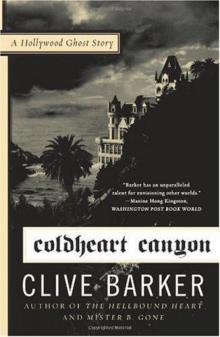 Coldheart Canyon: A Hollywood Ghost Story
Coldheart Canyon: A Hollywood Ghost Story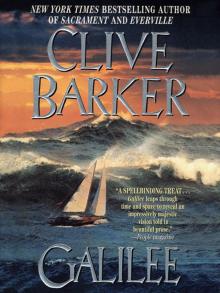 Galilee
Galilee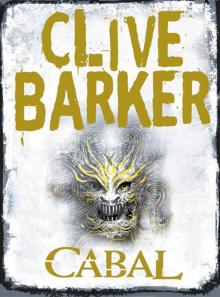 Cabal
Cabal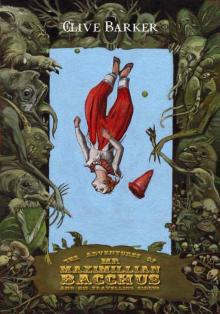 The Adventures of Mr. Maximillian Bacchus and His Travelling Circus
The Adventures of Mr. Maximillian Bacchus and His Travelling Circus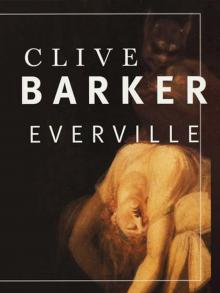 Everville
Everville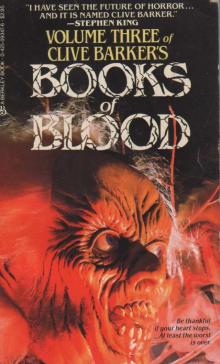 Books of Blood: Volume Three
Books of Blood: Volume Three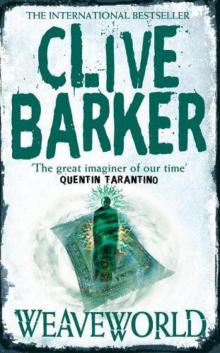 Weaveworld
Weaveworld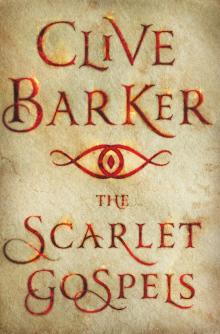 The Scarlet Gospels
The Scarlet Gospels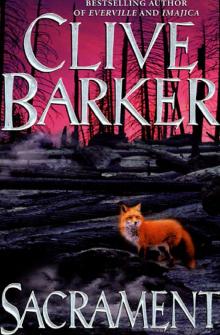 Sacrament
Sacrament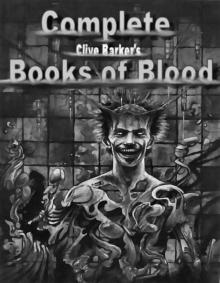 Books of Blood: Volumes 1-6
Books of Blood: Volumes 1-6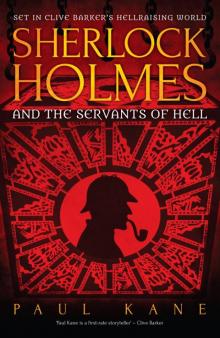 Sherlock Holmes and the Servants of Hell
Sherlock Holmes and the Servants of Hell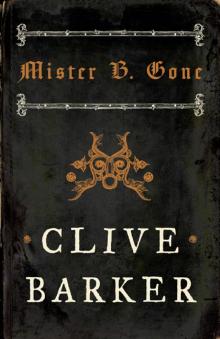 Mister B. Gone
Mister B. Gone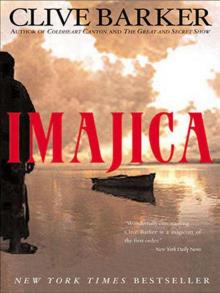 Imajica
Imajica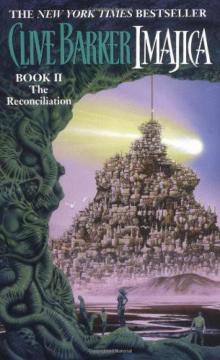 The Reconciliation
The Reconciliation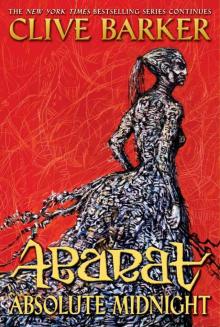 Abarat
Abarat Clive Barker's First Tales
Clive Barker's First Tales The Hellbound Heart
The Hellbound Heart The Inhuman Condition
The Inhuman Condition Infernal Parade
Infernal Parade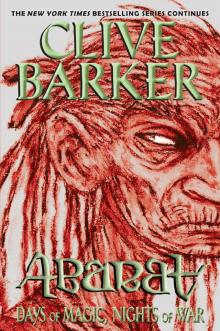 Days of Magic, Nights of War
Days of Magic, Nights of War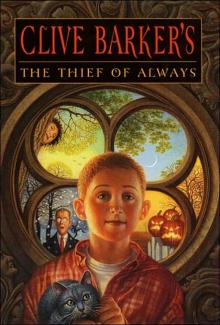 The Thief of Always
The Thief of Always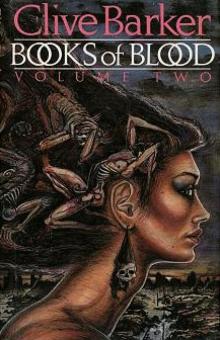 Books of Blood Vol 2
Books of Blood Vol 2 The Essential Clive Barker
The Essential Clive Barker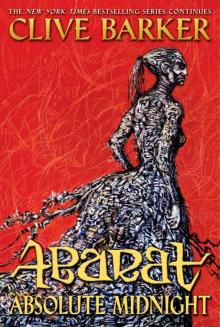 Abarat: Absolute Midnight a-3
Abarat: Absolute Midnight a-3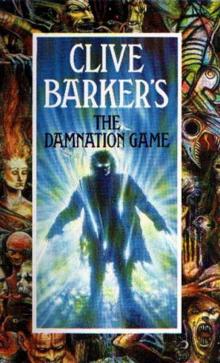 The Damnation Game
The Damnation Game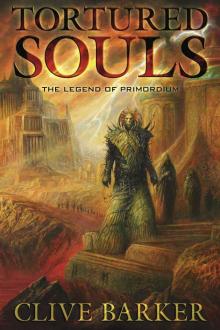 Tortured Souls: The Legend of Primordium
Tortured Souls: The Legend of Primordium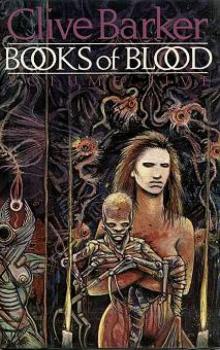 Books of Blood Vol 5
Books of Blood Vol 5 Imajica 02 - The Reconciliator
Imajica 02 - The Reconciliator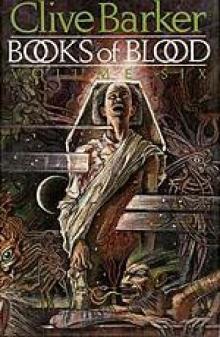 Books Of Blood Vol 6
Books Of Blood Vol 6 Imajica 01 - The Fifth Dominion
Imajica 01 - The Fifth Dominion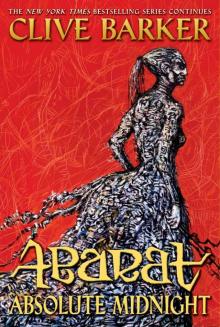 Abarat: Absolute Midnight
Abarat: Absolute Midnight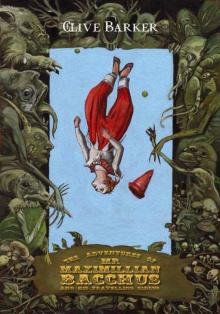 The Adventures of Mr. Maximillian Bacchus & His Traveling Circus
The Adventures of Mr. Maximillian Bacchus & His Traveling Circus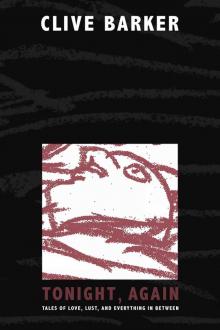 Tonight, Again
Tonight, Again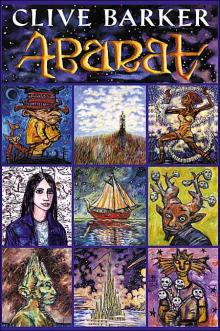 Abarat: The First Book of Hours a-1
Abarat: The First Book of Hours a-1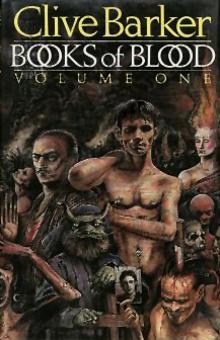 Books Of Blood Vol 1
Books Of Blood Vol 1 Age of Desire
Age of Desire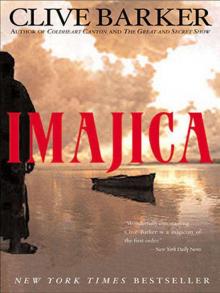 Imajica: Annotated Edition
Imajica: Annotated Edition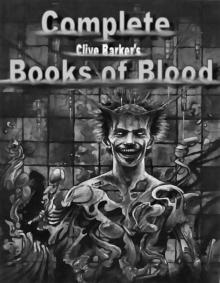 Complete Books of Blood
Complete Books of Blood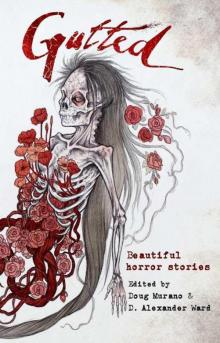 Gutted: Beautiful Horror Stories
Gutted: Beautiful Horror Stories Shivers 7
Shivers 7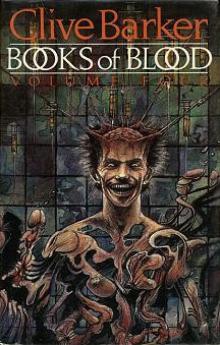 Books Of Blood Vol 4
Books Of Blood Vol 4